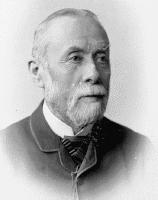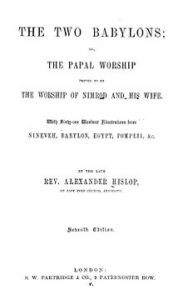No Pagan Links to Catholicism and Christianity
Pagan Links to Catholicism and Religion in Doubt
I have, of late, become somewhat concerned over what I see as growing support by a good many leaders within and without our Faith for there being no pagan links to Catholicism and Protestant Christianity. And how are these folks backing their outrageous claims? Quite simply: by claiming there is no academic, scholarly documentation and proof of such connections in existence. In their eyes, if there is no documented, scholar-backed proof of such pagan connections, then it doesn’t exist.
Doubting the Enemy’s Influence and Existence
What I fear we are seeing in this present move to wipe away any pagan connection to Catholicism and a great deal of Protestant Christianity from minds of Truth-seeking believers today, is a soft denial that the enemy even exists. And the danger that these leaders are posing to the Body of Messiah and any who would seek Truth, is a subtle spiritual disarming of believers.
Spiritual Warfare Has Existed Since The Fall
Now I realize that some would say that I am being a foolish sensationalist by making such statements. Everyone knows the devil exists and has existed from the beginning. Nevertheless, what most folks in positions of leadership in and out of our Faith fail to recognize is the spiritual warfare that has been ongoing in this world since the Fall. And it is that inability and in some cases refusal to recognize the spiritual war that has been waging since Eden by these leaders that is leading them to deny pagan-links to many of the practices, traditions and doctrines of the Catholic Church.
Proof is in the Pudding? Or No?
Of course there would be no documented proof of such pagan links. If there were, would it not then cause the masses to take note and maybe flee from these organizations? The enemy is crafty and is expert at covering up his tracks over the course of millennia. And men’s minds are quick to forget why he does the things he does.
Alexander Hislop Under Attack
Some people in and out of our Faith are calling Hislop a fraud because of his stance on pagan links to Catholicism.
Much of the ire being expressed against any suggestions of pagan links to the Catholic Church and parts of Protestantism seems to be directed at the man Alexander Hislop and his book “The Two Babylons.” In the last few years, Christian and Hebrew Roots leaders have come out of the woodwork, so to speak, to condemn and discredit the man and his book. In case you are unfamiliar with the man and his work, Alexander Hislop was a British minister of the early to middle 1800’s. He wrote “The Two Babylons” as a polemic against the Catholic Church, with a specific focus on supposed links to Babylonian paganism dating back to the days of the Tower of Babel.
Hislop and Book Once Revered
Many evangelicals and not too fee Messianics and Rooters over the years developed quite a bit of admiration for the man and his book. Many Christian and Hebrew Roots teachers have written books, based a number of their teachings and bible doctrines on the content of the book. I would venture to say that a great deal of Hislop’s book has shaped the way Hebrew Rooters view the ways of Catholicism and Christianity in general.
Hislop and Book No Longer Appreciated
Yet, over the last few years, a handful of Christian and Hebrew Roots leaders, teachers and preachers have come out against Alexander Hislop and his “The Two Babylons” book, accusing Hislop of being a fraud; a liar; an uninformed antagonist of the Roman Catholic Church. Some have gone so far as to medically diagnosed the man as being a schizophrenic. I should add, however, that none of these individuals are medical doctors and it is not clear to me what gives them the gravitas to diagnose someone who lived a century and a half, of which very little is known.
Academics Over Spirituality and Truth
Regardless, the issues being raised against Hislop and his book is simply that none of Hislop’s claims from the book can be academically proven. And because none of the book’s claims can be verified by scholars, then the author and his book are fraudulent.
I get that there may be a lack of proof as it relates to some of the book’s content and the author’s claims. Furthermore, I get that some of the content, given some of the archaeological and other documentary evidence that so-called scholars have come into possession of in the 20th and 21st centuries, may contradict or even debunk some of the Hislop’s claims. Things like this happen all the time in several areas of our Faith and the bible research. Just in recent years, the circumstances and timeline for the Hebrew Exodus out of Egypt has been challenged effectively changed as a result of recent archaeological findings. But no one goes out of their way to call the scientists and researchers who postulated the inaccurate circumstances and timeline of the Exodus in the first place frauds.
The Body Begins to Eat Their Young
What we are sadly seeing, even in Hebrew Root’s circles today, those who stand firm in their belief of the pagan-link to the Universal Church and her traditions, being labelled as frauds and deemed as divisive people in the Faith.
Just in the past few years, more and more Hebrew Roots teachers and preachers are speaking out in somewhat of a reserved defense of Christmas–at least they are saying that there is no pagan ties to Christmas as far as any scholars or authorities can determine. Many then launch into a polemic against Hislop. What most folks don’t understand, however, is that Christmas in this country, for the first century of so of its history, outlawed the keeping of Christmas. Bear in mind, this outlawing of Christmas came prior to Alexander Hislop’s birth and the publishing of The Two Babylons. [If you are interested, I posted a podcast on the subject of the pagan-links to Christmas.]
So one must ask themselves: what did those early settlers and Christians know about this Roman Catholic Church derived holiday that so many claim is not known today?
It’s Probably a Duck
I like the old adage: “If it quacks like a duck; if it waddles like a duck; if it looks like a duck, then it probably is a duck.” In other words, there’s something not right about the traditions and practices and doctrines of the Universal Church (ie., the Catholic Church and her offspring). Maybe it requires spiritual insight to see such things that maybe those who speak out against the existence of pagan links to the religion don’t see. I don’t know. For when we begin to speak and defend the Church Triumphant that has the traditions of venerating the dead and saints; worshiping the Virgin Mary; the rejection of the Feasts of the Creator with replacement of holidays such as Easter, Christmas, All Saint’s Day; Fat Tuesday; Lent; indulgences; infant baptism; and so many other Traditions, we are doing nothing but deluding ourselves and denying the Truth that is right before our eyes.
Let’s Be Reasonable About This Thing
Maybe Alexander Hislop’s work in some places is lacking scholarly integrity (whatever that actually looks like), but the premise of what he was trying to get across is that we must be able to discern the holy from the unholy; the pure from the impure; the Truth from lies; the biblical/God-breathed from the manmade; the spiritual from the carnal; and hold to Truth that comes only from the Word of YHVH and the revelation of YHVH’s Holy Spirit.
If scholarly documentation and archaeological proofs are required to certify the existence of pagan-links to the Universal Church and some of her offspring, what’s next? Will they then begin to require scholarly documentation and archaeological proofs that our Creator and our Master Yahoshua Messiah exists? Just because we don’t have the proverbial smoking gun for pagan-links to religion don’t mean it ain’t so. Just saying.
Faithfully submitted.



0 Comments